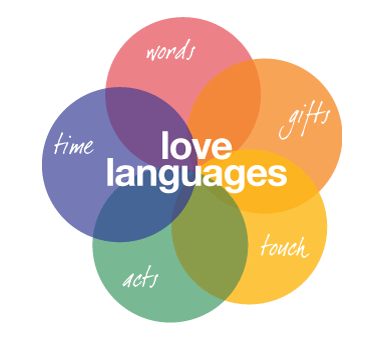




The Five Love Languages are the principal ways in which people show and receive love and affection. Gary Chapman initially presented this concept in The Heart of the Five Love Languages, one of his books.
These concepts are being applied in relationship therapy and are beginning to be covered in academic research on human mind.
These languages are;
- Quality time
- Words of affirmation
- Acts of service
- Gift and
- Touch
 Quality Time:
Quality Time:
The finest ways to express love are by spending time together, doing activities together, and concentrating on one another. You want your friend or spouse to give you their whole attention and engage in meaningful activities with you if this is your love language. This also entails engaging dialogue.
Try Doing:
- Cooking and baking together
- Take a walk.
- Avoid using digital devices while you're among others.
- Play board and card games.
- Together, devise an overnight or day vacation.
- Home movie and cuddling night.
- Exercise together.
- Take part in worthwhile conversations.
- To continue getting to know one another, play 20 questions.
 Words of Affirmation:
Words of Affirmation:
Compliments and verbal praise help you feel better about yourself and increase your confidence. You need the other person to understand you and see things from your point of view in order to feel encouraged. When people are aware of what is important to you, you feel loved. It's crucial to consider your voice tone.
Try saying:
- Congratulations! I'm proud of you.
- I'm available to you.
- I appreciate you taking care of me.
- I regret/I apologize for...
- I want, need, and adore you.
- You are the love of my life and you mean the world to me.
- Without you, I'm not sure what I would do.
- You're doing fantastic; keep going; I have faith in you.
- I am aware of how difficult recent times have been.
- You are my best friend, and I count myself fortunate to have you in my life.
 Receiving Gifts:
Receiving Gifts:
There is no need to spend a lot of money to convey a strong message of affection. They can be made, bought, or found. A partner who feels abandoned and mistreated will be the one whose birthdays, anniversaries, or gift-giving preferences are consistently forgotten. This would include the gift of your presence in a time of need.
Try Doing:
- Purchase flowers for no reason.
- Send them a gift that they have been wanting.
- Enroll them in a course that interests them.
- Create a little hamper filled with items in their favorite color or theme.
- Create handmade presents.
- Think of an unusual encounter to prepare for
- Gift that made you think about yourself.
- Leaving a "I was thinking about you" gift.
- Take a picture of the two of you and frame it.
 Acts of Service:
Acts of Service:
It will take patience and imagination to love someone whose vocabulary is "acts of service." To be seen as a gift of love, these deeds of service must be performed with enthusiasm. Examples include doing errands or favors for someone, cleaning their homes, and performing things without being asked.
Try Doing:
- Help in the kitchen or prepare dinner.
- doing errands.
- Make coffee or tea in the morning.
- Make a fix for what's wrong.
- When getting up, enquire about any needs or specific requests.
- Without being asked, lend a hand.
- Purchase their preferred snack from the grocery store.
 Physical Touch:
Physical Touch:
A touching gesture. Hugs, shoulder rubs, leaning against someone else, etc. are a few examples.
Try Doing:
Walking with an arm around the waist, holding hands, or both.
When you settle down to watch anything, you might lightly touch their leg with your hand.
While your partner is cooking, you receive a surprise hug from behind.
joking with your partner.
holding your lover when they experience unpleasant feelings
combing and stroking your partner's hair.
Love Languages:
Words Of Affirmation: Encourage, Empathize, Appreciate, Affirm
Do: Be sincere and meaningful with your words, send spontaneous, beautiful texts, leave written notes, and express gratitude.
Don't: without acknowledging or appreciating the effort; one-sided; ineffective communication.
Physical Touch: Body Language and Touch
Do: Strokes on the cheek or hair, hugs, and little kisses on the shoulder, hand, or face.
Don't: Refuse affection, avoid physical contact, and refrain from cuddling your partner when they are in distress.
Receiving Gifts: Thoughtfulness
Do: Thoughtful gifts and actions Spending less money will allow your gifts to show how well you know your companion.
Don't: Ignore occasions, donate without considering them, and show little enthusiasm when accepting gifts.
Quality Time: Uninterrupted Time Together
Do: Put your attention on quality alone time and in-depth chats with your companion.
Don't: Be drawn away by devices like phones. For a long time without spending any quality time with each other.
Acts Of Service: Actions Speak Louder Than Words!
Do: Work, favors, planning, and luxuries like massages or running a bath all count as ways to help.
Don't: Avoid carrying out plans, and let your partner do everything physically, such as cooking and cleaning.

